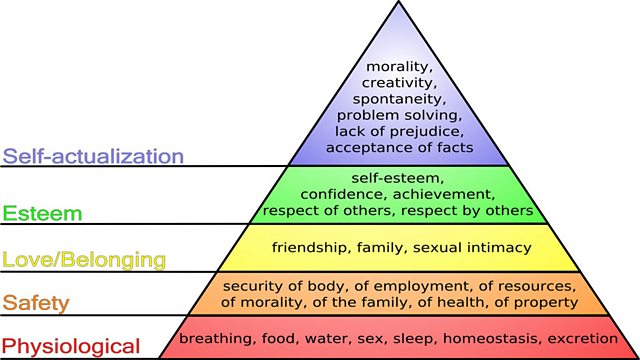Abraham Maslow’s Hierarchy of Needs
Abraham Maslow's theory that the brain has independent motivational systems unrelated to reward systems and unconscious desires, led to the idea of humans achieving greater goals.
In a special programme, Health Check examines the work of Abraham Maslow, who in the mid-twentieth century developed a theory of human motivation that has been particularly influential in management.
In his 1954 book Motivation and Personality, Maslow explained his hierarchy of needs theory. Only when basic physiological needs and those of safety and security are met, can humans aspire to be motivated by higher goals such as status and self-respect. He maintained that only a small number of exceptional people, citing Albert Einstein and Eleanor Roosevelt as examples, are capable of reaching the highest level of motivation and are driven by the desire to accomplish all they are capable of.
Maslow was a pioneer in his field; a response to the sharply opposing schools of psychoanalysis and behaviourism which dominated psychology at the time.
Claudia Hammond visits Brandeis University outside Boston, where Maslow was the founding Professor of Psychology. She speaks to people that knew him and hears from psychologists and management experts about how his influence persists. Contributors include: Margie Lachman, professor of Psychology at Brandeis University; Lawrence Fuchs, emeritus professor of American Civilization and Politics at Brandeis (who died earlier in the year) and Warren Bennis, professor of Management and Organization at the USC Marshall School of Business.
Last on
More episodes
Broadcasts
- Wed 17 Jul 2013 18:32GMTÃÛÑ¿´«Ã½ World Service Online
- Thu 18 Jul 2013 01:32GMTÃÛÑ¿´«Ã½ World Service Online
- Thu 18 Jul 2013 08:32GMTÃÛÑ¿´«Ã½ World Service Online
- Sun 21 Jul 2013 22:32GMTÃÛÑ¿´«Ã½ World Service Online
Podcast
-
![]()
Health Check
Health issues and medical breakthroughs from around the world.


